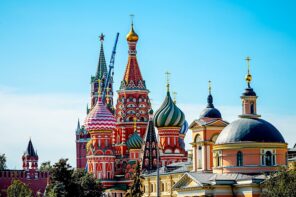Life is white. And I am black. Jesus and his lawyer are coming back.
–The Eels, from “Novocaine for the Soul,” 1996
I can’t vouch for Jesus, but his lawyers might want to gear up for a potential flurry of activity in Russia. The representatives of other religions, and even atheists, might want to lawyer up as well. Why?
Let me start with my memory of a Facebook status (the quotation may be slightly inexact) posted by a Russian acquaintance at some point in mid-2012:
Who will protect my feelings as an atheist?
She wrote this in the wake of the Pussy Riot trial. As readers of Religion Dispatches will recall, on August 17, 2012, the trial itself concluded with members of the feminist punk-rock collective sentenced to two years in penal colonies for “hooliganism motivated by religious hatred.” (Samutsevich managed to be freed on probation following an appeal, while Tolokonnikova and Alyokhina remain imprisoned). According to the Levada Center, as of April, 2013, a full 56% of the Russian population agreed with the verdict—which goes some way toward demonstrating why a legislative initiative to increase protections for religious believers’ feelings, introduced in September 2012, could get off the ground.
This immediate cause for my atheist acquaintance’s concern about the equal protection of her own feelings is probably a good deal less familiar to Western readers than the Pussy Riot trial itself, which caused a sensation in the Western media. (In my opinion, the most nuanced coverage of the events associated with Pussy Riot can be found here, in a piece that I readily admit I wish I had written myself.)
The protection of religious believers’ feelings has been enshrined in the Russian Civil Code for quite some time, but making it a criminal offense to insult the feelings of religious believers could bring with it much harsher penalties. The Russian web was abuzz with a lively discussion of this topic last fall, and as the initiative was recently passed, there is renewed interest in the Russian media and blogosphere.
Аccording to the just passed redaction of article 148 of the Russian Criminal Code, “public acts expressing manifest disrespect for society and carried out with the goal of insulting the feelings of religious believers” could bring fines of up to 300,000 rubles (over $9000) or up to a year of imprisonment, or fines of up to 500,000 rubles (over $15,000)—or up to three years in prison if the act is carried out in a place of worship or a place otherwise set aside for religious rituals or ceremonies (as was the famous Pussy Riot “punk prayer”).
This redaction was approved by Russia’s higher legislative chamber, the Federation Council, on June 26, following the requisite three successful readings in the lower chamber, the State Duma. President Putin signed it into law on June 30, and it went into effect on July 1. But then something curious happened.
In an interesting twist in the discussions surrounding the legislative initiative as it went forward, the fact that the law might protect the feelings of only the four “traditional” faiths of Russia—Christianity, Islam, Judaism, and Buddhism—led to the expression of concerns about potential discrimination not only from human rights organizations, but also from Putin’s cabinet. The drafters of the new redaction, and apparently the Kremlin itself, seemed at least for a time to have accepted my atheist acquaintance’s reasoning with respect to the protection of her feelings.
But instead of rejecting the principles behind the law, they sought to expand its scope. For a time, revisions were reportedly underway to redact Article 148 in such a manner as to protect the feelings of atheists as well as practitioners of both “traditional” and “non-traditional” faiths. At the end of the day, the redaction that was passed omitted any distinction between “traditional” and “non-traditional” faiths, but it also omitted any mention of atheists. The Russian web and blogosphere has continued to discuss the potential need to protect the rights of atheists, but whether discussions about further revising Article 148 are ongoing among legislators is unclear. A new redaction does not seem likely to pass any time soon.
How the current redaction will work in practice is anyone’s guess, but it seems likely to lead to a less open climate for public discourse. It may also dovetail with rising Russian homophobia and legal persecution of the LGBTQ community, a frightening development.
Personally, I appreciate and enjoy the radically liberal American approach to free speech, including the right to blaspheme—which is of course not to say that to do so is always wise or tasteful. But, as retired history professor Anthony Edmonds of Ball State University used to quip in the classroom, a historian’s favorite hand is “the other hand.” For better or for worse, I am professionally trained as a historian. Thus, despite my respect for American-style free speech, I recognize that some states have crafted social contracts that accept greater limitations on speech than we do in the US, in order to protect other democratic values.
As both classic liberal and communitarian theorists recognize, fundamental modern democratic values such as liberty and equality can come into conflict, requiring a careful balancing act that should derive from public debate and consensus.
Pluralism, a fundamental condition of modern existence, is managed by different states and societies in different ways. The current Russian initiative on the protection of believers’ feelings may be shaped to some extent by an imperial history involving centuries of ‘actually existing pluralism,’, which is certainly the source of Russia’s conception of its four “traditional” confessions. But the new initiative is in fact not so different in form from the laws of some other modern states.
Israel, Poland, and even Finland and Germany are among the countries in which blasphemy, offense of religious believers’ feelings, and/or the defamation of religion can lead to prison time .
The laws in these countries are not just dead-letter relics, but are sometimes enforced. For example, in 2006, a German court handed down a one-year suspended prison sentence and 300 hours of community service for the offense of printing the word “Koran” on toilet paper, while a 2008 case in Finland led to a two-year prison sentence. Amusingly enough, there is also a 2005-2007 British analogue of sorts to the much more recent, and more quickly resolved, Russian kerfuffle over “Jesus Christ, Superstar.” One should take such facts into consideration in order to avoid responding to the current Russian situation in an uninformed, Russophobic way.
On the other other hand, many Western liberals have put forth sharp and reasoned critiques of blasphemy laws. Paul Sturges, for example, made the following conclusion about the case of Greece:
“Complaints leading to prosecution under Article 199 seem to have always concerned the Orthodox Church rather than the other tolerated religions. These blasphemy laws in Greece effectively serve the purpose of integrating church and state and have been used to the detriment of free speech and cultural manifestations on a regular basis.”
Unfortunately, a similar outcome in Russia does not seem unlikely. The law could certainly be applied unevenly. According to Shamil Kashaf’s recent presentation at the conference “The Varieties of Russian Modernity,” hosted by my employer, the Russian Presidential Academy of National Economy and Public Administration (RANEPA), Russian Muslims already feel marginalized in public discourse relative to the ROC. In addition, like US Muslims, Russian Muslims frequently encounter resistance to efforts to construct new mosques.
There is also the concern that the Russian legislative initiative to protect all believers’ feelings might lead, in the face of uncertainty over how it will be applied, to a general chilling effect on public discourse with respect to religion and state.
In a recent Facebook post, the prominent Russian scholar and commentator on religious matters Dmitry Uzlaner put it this way (my translation, quoted with permission):
“The result will be some sort of religious zoo. Don’t annoy the tiger. Don’t feed the elephant candy. Don’t knock on the glass, don’t bother the mouse. All that remains is to walk among the enclosures taking pictures without a flash. And scholars, evidently, will have to master the tenderly touching intonation of [host of the Russian television show “In the World of Animals”] Nikolai Drozdov and the affected face expression: ‘And those Buddhists, just look how lovely they are…’”
Uzlaner has a point. (Full disclosure: he is my colleague in work on the RANEPA-published religious studies journal State, Religion and Church in Russia and Worldwide). The fundamental fact remains that adherents of different religions hold to contradictory truth claims, and while most educated people would surely agree with the goal of establishing a just society in which they could all, by and large, “just get along,” a too strict or too strictly enforced law on the offense of religious believers’ feelings could potentially hinder interreligious dialogue, critical thinking, scholarship, and teaching.
A sociologist of religion, for example, is going to examine a religion in social scientific terms that may by their very nature be offensive to some adherents who cannot abide examining their own tradition from an outside, scholarly point of view.
Do they then get to sue over the offense of their feelings by methods of inquiry universally recognized by scholars as legitimate?
If some religious believers are insulted by the expression of atheistic views, and atheists are insulted (as they should be) if told to keep quiet, whose feelings trump whose? When and where the line is crossed from legitimate investigation or criticism into “extremism” or “insulting the feelings of religious believers” is an important question—and in the Russian case we have precious little to go on by way of an answer. What we do have is less than encouraging. Enshrining these concerns into law, of course, makes the state the final arbiter of the question. Despite the existence of such laws in some modern Western democracies, it is reasonable to ask whether such a move is wise.
We will have to watch how events unfold in Russia. Raising concerns about potential problems with the law is sensible, and one might hope that the public expression of such concerns will reduce instances of abuse in the eventual application of the law. But one should evaluate the legislative initiative in a broader European and global context along with the specifically Russian context. The fact is that there are real problems to be solved in modern societies with respect to multiculturalism, toleration and coexistence, and different societies have to work within their own systems to seek solutions.
As an American liberal torn between some of the philosophical premises of classic liberalism and those of the communitarian critique of liberalism, I appreciate the classic US approach to free speech while recognizing that it cannot immediately be exported as one-size-fits-all.
Still, I remain opposed in principle to prison time for blasphemy as such (that is, apart from other aggravating circumstances such as, say, direct incitement of violence against members of a religious group). I would caution against undue alarmism, but I do take seriously the negative potential of the Russian legislative initiative to protect people’s religious feelings.





